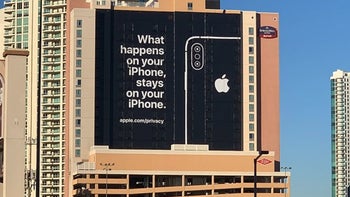Hilarious new Apple iPhone ad reveals the kind of information that the device keeps to itself

Over the last couple of years, Apple has promoted the privacy of the iPhone. In a new 60-second television ad that you're sure to see on your t.v. set this coming weekend, Apple explains that "Some things shouldn’t be shared. That’s why iPhone is designed to help give you control over your information and protect your privacy." The commercial envisions what would happen if you didn't own an iPhone and leaked out your personal information like a sieve.
- iPhone 13: price, release date, features, and specs
Once again, Apple promotes privacy on the iPhone
The new ad starts with a man on a bus screaming out to his fellow passengers that he had browsed eight sites for divorce attorneys earlier in the day. A woman in a movie theater (Google it) is telling a random guy sitting near her that she always uses Pauline@paulinephu.com to log in to all her accounts. Perhaps the funniest example takes place in an office environment where two women are sharing verbally what would ordinarily be texted between them in private. "I love working with you," says one of the women. "Me too," responds the other. Then comes an exchange of emoji that you can just visualize: "Red heart emoji." "Pink heart emoji." After a few more emoji-based exchanges, one of the women has a comment to share about a fellow worker. "I hate Lee though," she says, "Puke emoji. Puke emoji." Lee happens to be sitting behind the women and overhears the comment. Another woman is walking home on a fairly busy street and is telling everyone, "my home is in 1,000 feet." Not the type of information that one should be giving away.


You get the idea. Apple says that all of this information can be protected by using the iPhone. As Apple says at the end of the ad, "Some things shouldn't be shared. iPhone helps keep it that way." For example, a couple are eating at a restaurant when the woman says, "On March 15th at 9:16 am I purchased prenatal vitamins and four pregnancy tests." That normally wouldn't be the type of personal news you would want to share. No one in their right mind would take a bullhorn and broadcast their credit card information to people that they don't know.
As we said, this isn't the first time that Apple has pushed the privacy angle. You might recall that during the 2019 Consumer and Electronics Show in Las Vegas, Apple put up a billboard designed to catch the eye of those walking to and from the Las Vegas Convention Center where the CES was being held. A play on the cities' iconic tourist slogan of "What happens in Las Vegas, stays in Las Vegas," Apple's billboard stated, "What happens on your iPhone, stays on your iPhone."
When it comes to privacy, Apple has talked the talk and walked the walk. A couple of times it refused to open iPhone units belonging to accused terrorists for fear that the special software needed to perform this task could be broken down and passed along by hackers. That would make the data inside every iPhone user's handset vulnerable. In both high-profile situations, the FBI had to rely on a third-party company like Israel's Cellebrite to unlock the devices.
Apple's decision to protect the privacy of its customers has at times put it at odds with the U.S. government. Earlier this year the FBI asked Apple to unlock a pair of older iPhone models belonging to Mohammed Saeed Alshamrani. The latter was accused of killing three people at the Naval Air Station in Pensacola, Florida last December. To prove that there was some information on Alshamrani's iPhone that needed to be scrutinized by law enforcement, Attorney General William Barr noted that the alleged killer fired a round into one of his iPhones during a shoot out with the cops.













Things that are NOT allowed: